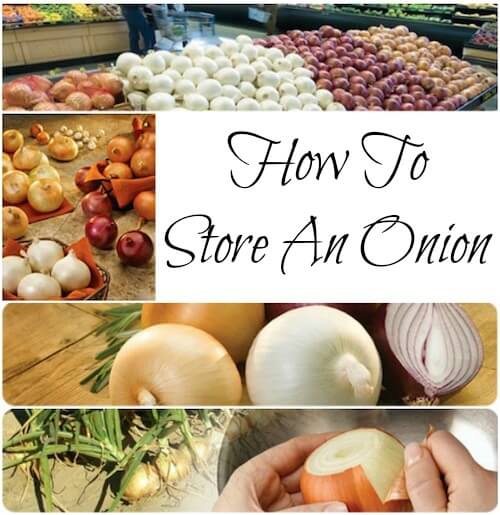Store onions in a cool, dry, and well-ventilated place. Avoid storing onions in plastic bags.
Onions are a staple in many kitchens, adding flavor to various dishes. Proper storage ensures they remain fresh and ready for use. Keep onions in a cool, dry place away from direct sunlight. Ventilation is crucial to prevent mold and spoilage.
Mesh bags or baskets work well for this purpose. Storing onions in plastic bags traps moisture, leading to rot. Avoid refrigerating whole onions, as the cold environment can turn them mushy. With proper storage, your onions can last several weeks, maintaining their taste and quality. This simple method helps reduce waste and keeps your pantry stocked with fresh onions.
Introduction To Onion Storage
Onions are a kitchen staple. They add flavor to many dishes. Storing them properly keeps them fresh and tasty. Proper storage ensures they last longer. Read on to discover how to store onions effectively.
Importance Of Proper Storage
Proper storage of onions is crucial. It prevents them from spoiling quickly. Fresh onions enhance the flavor of your meals. Here are some benefits of storing onions correctly:
- Prevents mold and rot
- Maintains their crisp texture
- Reduces waste
- Saves money
Common Storage Mistakes
Many people make mistakes when storing onions. These mistakes can lead to quicker spoilage. Avoid these common storage errors:
- Storing in Plastic Bags: Plastic bags trap moisture. This can cause onions to rot.
- Refrigerating Whole Onions: Whole onions should not be refrigerated. They need a cool, dry place.
- Storing Near Potatoes: Keep onions away from potatoes. Potatoes emit moisture and gases that spoil onions faster.
Best Practices For Storing Onions
To keep your onions fresh, follow these best practices:
| Storage Method | Description |
|---|---|
| Mesh Bags | Allow air circulation. Prevents moisture buildup. |
| Cool, Dry Place | Ideal for whole onions. Keeps them fresh longer. |
| Separated from Potatoes | Prevents gases from spoiling onions. |
Choosing The Right Onions
Storing onions properly starts with choosing the right type. Different onions have different storage needs. Picking the best variety is crucial for long-term freshness. Below, we’ll explore various onion types and their suitability for storage.
Different Varieties
Onions come in many varieties. Each has unique properties and uses. Common types include yellow, red, white, and sweet onions.
- Yellow Onions: These are the most versatile. They work well in many dishes.
- Red Onions: Known for their mild flavor. Great for salads and sandwiches.
- White Onions: These have a sharp taste. Often used in Mexican dishes.
- Sweet Onions: These are less pungent. Ideal for raw uses like salads.
Best Types For Long-term Storage
Not all onions store well. Some are better suited for long-term storage.
| Onion Type | Storage Suitability |
|---|---|
| Yellow Onions | Excellent for long-term storage. They last up to six months. |
| Red Onions | Good for short-term storage. They last one to two months. |
| White Onions | Not ideal for long-term storage. Best used within a few weeks. |
| Sweet Onions | Poor for long-term storage. Use them within a few weeks. |
For the best results, choose yellow onions for storage. They have the longest shelf life.
Ideal Storage Conditions
Storing onions correctly ensures they stay fresh and flavorful. Understanding the ideal storage conditions is key to extending their shelf life. Let’s delve into the optimal temperature and humidity levels for storing onions.
Temperature Requirements
Onions thrive in cool environments. The ideal temperature range for storing onions is between 32°F and 40°F (0°C to 4°C). This range helps prevent spoilage and sprouting. Avoid storing onions in places with fluctuating temperatures.
Humidity Levels
Onions need low humidity to stay fresh. The ideal humidity level is between 65% and 70%. High humidity can cause onions to become soft and rot. Store onions in a well-ventilated area to maintain the right humidity level.

Credit: brooklynfarmgirl.com
Storage Methods
Knowing how to store onions properly can make them last longer. It can also keep them fresh and tasty. Let’s look at different storage methods.
Pantry Storage
Storing onions in the pantry is easy and effective. Keep them in a cool, dark place. Airflow is important, so use mesh bags or paper bags. This prevents moisture build-up, which can cause rot.
- Temperature: Keep between 45-55°F (7-13°C).
- Humidity: Low humidity helps prevent sprouting and mold.
- Containers: Avoid plastic bags and sealed containers.
Refrigeration
Refrigeration is suitable for cut onions or onions that are starting to sprout. Wrap cut onions in plastic wrap or store in airtight containers. This keeps them fresh and prevents odors from spreading.
- Temperature: Store at 40°F (4°C) or lower.
- Humidity: Moderate humidity is best.
- Containers: Use airtight containers or plastic wrap.
Freezing
Freezing onions is great for long-term storage. Chop onions into desired sizes before freezing. Place them on a baking sheet to freeze individually. Once frozen, transfer to airtight containers or freezer bags.
- Step 1: Peel and chop onions.
- Step 2: Spread on a baking sheet.
- Step 3: Freeze until solid.
- Step 4: Transfer to airtight containers or freezer bags.
Frozen onions are best used in cooked dishes. They may lose some texture but will still add great flavor.
Proper Containers
Storing onions correctly can extend their shelf life. Choosing the right containers is crucial. Proper containers help keep onions fresh and flavorful for longer periods. Below are some guidelines on using the best containers for storing onions.
Using Mesh Bags
Mesh bags are an excellent choice for storing onions. They allow air to circulate, which helps prevent moisture buildup. Moisture can cause onions to rot quickly. Using mesh bags ensures that air flows freely around each onion.
Place the onions in the bag and hang it in a cool, dark place. This setup keeps onions dry and fresh. Avoid overcrowding the bag. Overcrowding can restrict air flow and cause spoilage.
Avoiding Plastic Bags
Plastic bags are not suitable for storing onions. They trap moisture, which can lead to mold and sprouting. Onions need to breathe. Plastic bags do not allow for this.
Opt for breathable materials instead. If you must use a plastic bag, poke holes in it to allow air circulation. This method is not ideal but better than sealing the bag completely.
| Container Type | Breathability | Suitability |
|---|---|---|
| Mesh Bags | High | Excellent |
| Plastic Bags | Low | Poor |
:max_bytes(150000):strip_icc()/how-to-store-onions-1389144_FINAL-5c5de858c9e77c0001d31c71.png)
Credit: www.thespruceeats.com
Dealing With Cut Onions
Storing cut onions can be tricky. They can spoil quickly and emit a strong odor. But with the right steps, you can keep them fresh for longer.
Short-term Storage Solutions
For short-term storage, use airtight containers. These containers keep moisture out and prevent spoilage. Glass containers are the best choice. They won’t absorb the onion smell.
Another option is to wrap the cut onion in plastic wrap. Then, place it in a resealable plastic bag. This double layer helps keep the onion fresh.
If you use a zip-lock bag, remove as much air as possible. This slows down the spoilage process.
Preventing Odor
Cut onions can leave a strong smell in your fridge. To combat this, try these tips:
- Store cut onions in a glass container. Glass does not retain odors.
- Use a small bowl of baking soda in your fridge. Baking soda absorbs bad smells.
- Place a piece of bread in the storage container. Bread soaks up the onion odor.
You can also use charcoal to absorb odors. Just place a small piece in your fridge.
Using these methods, you can keep your cut onions fresh and your fridge odor-free.
Signs Of Spoilage
Knowing how to store onions correctly helps keep them fresh longer. Yet, even with the best storage methods, onions can spoil. Identifying the signs of spoilage early can save you from using bad onions.
Visual Indicators
Visual signs are the easiest way to spot a spoiled onion. Look for these common indicators:
- Mold Growth: Black or white mold spots on the skin.
- Discoloration: Brown or dark patches on the surface.
- Sprouting: Green shoots coming from the top.
- Wrinkled Skin: Dry, wrinkled, or shriveled outer layers.
Smell And Texture
Smell and texture changes are also strong indicators of spoilage. Pay attention to the following:
- Off Odor: A strong, sour, or musty smell.
- Soft Spots: Areas that feel soft or mushy to the touch.
- Slime: A slimy or sticky surface.
Using these signs can help you identify spoiled onions quickly. Always check onions before use to ensure they are fresh.
Extending Shelf Life
Onions are a staple in many kitchens. Proper storage can extend their shelf life. This guide will help you keep onions fresh for longer. Read on to learn more.
Using Preservatives
Preservatives can help onions last longer. You can use natural or chemical preservatives. Here are some options:
- Salt: Salt absorbs moisture and prevents spoilage. Sprinkle salt on cut onions.
- Vinegar: Vinegar acts as a natural preservative. Store onions in a vinegar solution.
- Citric Acid: Citric acid keeps onions fresh. Use it in small quantities.
Alternative Storage Techniques
Different storage methods can also extend the shelf life of onions. Consider trying these techniques:
- Refrigeration: Refrigerate onions to keep them fresh. Place them in a mesh bag in the crisper drawer.
- Freezing: Freeze onions to extend their shelf life. Chop them and store in airtight containers.
- Dehydration: Dehydrate onions for long-term storage. Use a food dehydrator or oven.
| Method | Duration | Notes |
|---|---|---|
| Refrigeration | 1-2 months | Keep in a mesh bag |
| Freezing | 6-8 months | Store in airtight containers |
| Dehydration | Up to 1 year | Store in a cool, dry place |

Credit: www.onions-usa.org
Frequently Asked Questions
How Long Can You Store Onions?
Onions can be stored for several weeks to months. Store them in a cool, dry place. Ensure proper ventilation to extend shelf life.
Can You Store Onions In The Fridge?
Yes, you can store onions in the fridge. Use a paper bag to avoid moisture accumulation. This helps prevent spoilage.
What Is The Best Way To Store Onions?
Store onions in a cool, dark, and well-ventilated place. Use mesh bags or baskets for better airflow. Avoid plastic bags.
Can You Freeze Onions For Storage?
Yes, you can freeze onions. Chop them into small pieces first. Store them in airtight containers or freezer bags to maintain quality.
Conclusion
Storing onions correctly extends their shelf life and keeps them fresh. Keep them in a cool, dry place. Use mesh bags or ventilated containers for better air circulation. Avoid storing onions near potatoes to prevent spoilage. Follow these tips to enjoy fresh onions for a longer time.
